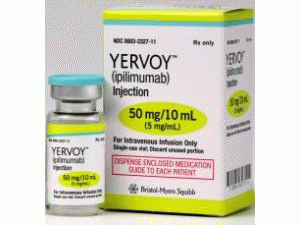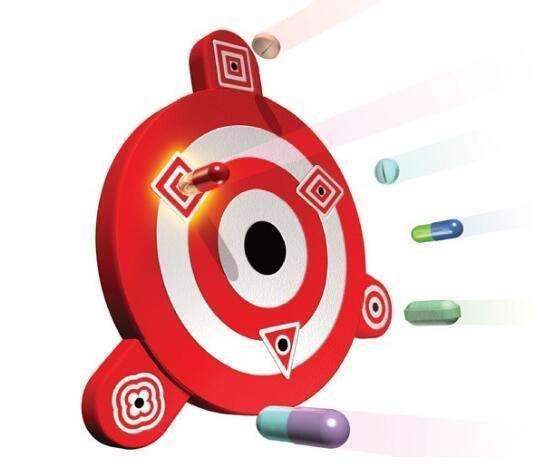易普利姆玛注射液ipilimumab(Yervoy 50mg/10ml)
 产地国家:瑞士
处方药:是
所属类别:50毫克/10毫升/瓶
包装规格:50毫克/10毫升/瓶
计价单位:瓶
生产厂家英文名:BRISTOL MYERS SQUIBB
原产地英文商品名:YERVOY 50mg/10ml/vial
原产地英文药品名:ipilimumab
中文参考商品译名:YERVOY 50毫克/10毫升/瓶
中文参考药品译名:伊匹单抗
简介:
最近,美国及欧洲批准施贵宝公司研制的一种新药YERVOY(IPILIMUMAB)INJECTABLE INJECTION,可用于治疗转移性或晚期的黑色素瘤黑色素瘤是皮肤癌中最致命的类型,之前几乎没有什么有效的治疗方法。这种新批准的药物学名是ipilimumab,品牌名为Yervoy,是首个能够明显延长患者生命的黑色素瘤药物。这种药物的作用机理是通过刺激人体本身的免疫系统来对抗癌细胞,称为免疫治疗,是一种新兴的癌症治疗方法。临床试验显示,该药物可平均延长10个月的生命,有些几年前就开始使用该药物进行治疗的病人现在还活着,还有一小部分患者的肿瘤在治疗后还变小了。不过,大约12.9%的患者在使用该药物后发生了比较严重的自身免疫反应,其他可能的副作用还包括疲劳、腹泻、皮疹、内分泌不足、以及肠道炎症。作用机制CTLA-4是T-细胞激活的负性调节剂。Ipilimumab结合至CTLA-4和阻断CTLA-4与其配基,CD80/CD86的相互作用。CTLA-4的阻断曾显示增加T-细胞激活和增殖。在黑色素瘤患者中ipilimumab的作用机制影响是间接的,可能通过T-cell介导的抗-肿瘤免疫反应。
适应症:YERVOY是一种人类的细胞毒性T淋巴细胞抗原4(CTLA-4)-阻断抗体适用于治疗不可切除的或转移黑色素瘤。
剂量和给药方法:(1)YERVOY 3mg/kg静脉历时90分钟给予每3周总共四剂。(2)对严重不良反应永远终止。
剂型和规格:(1)50mg/10mL(5mg/mL)(2)200mg/40mL(5mg/mL)
禁忌症:无。
警告和注意事项:免疫介导不良反应:对严重反应永远终止。对中度免疫介导不良反应不给药直至返回基线,改善至轻度严重性,或完全解决,和患者正在接受低于7.5 mg泼尼松[prednisone]或等同物每天。对严重,持久,或复发性免疫介导反应给予全身高剂量皮质激素。
(1)免疫介导肝炎:每次YERVOY给药前评价肝功能检验。(2)免疫介导内分泌病变:每次给药前监查甲状腺功能试验和临床化学。每次随访时对内分泌病变体征和症状评价。需要时开始激素替代治疗。
不良反应:最常见不良反应(≥5%)是疲乏,腹泻,瘙痒,皮疹,和结肠炎。
特殊人群中使用:(1)妊娠:根据动物资料,YERVOY可能致胎儿危害。(2)哺乳母亲:终止哺乳或终止YERVOY。
产地国家:瑞士
处方药:是
所属类别:50毫克/10毫升/瓶
包装规格:50毫克/10毫升/瓶
计价单位:瓶
生产厂家英文名:BRISTOL MYERS SQUIBB
原产地英文商品名:YERVOY 50mg/10ml/vial
原产地英文药品名:ipilimumab
中文参考商品译名:YERVOY 50毫克/10毫升/瓶
中文参考药品译名:伊匹单抗
简介:
最近,美国及欧洲批准施贵宝公司研制的一种新药YERVOY(IPILIMUMAB)INJECTABLE INJECTION,可用于治疗转移性或晚期的黑色素瘤黑色素瘤是皮肤癌中最致命的类型,之前几乎没有什么有效的治疗方法。这种新批准的药物学名是ipilimumab,品牌名为Yervoy,是首个能够明显延长患者生命的黑色素瘤药物。这种药物的作用机理是通过刺激人体本身的免疫系统来对抗癌细胞,称为免疫治疗,是一种新兴的癌症治疗方法。临床试验显示,该药物可平均延长10个月的生命,有些几年前就开始使用该药物进行治疗的病人现在还活着,还有一小部分患者的肿瘤在治疗后还变小了。不过,大约12.9%的患者在使用该药物后发生了比较严重的自身免疫反应,其他可能的副作用还包括疲劳、腹泻、皮疹、内分泌不足、以及肠道炎症。作用机制CTLA-4是T-细胞激活的负性调节剂。Ipilimumab结合至CTLA-4和阻断CTLA-4与其配基,CD80/CD86的相互作用。CTLA-4的阻断曾显示增加T-细胞激活和增殖。在黑色素瘤患者中ipilimumab的作用机制影响是间接的,可能通过T-cell介导的抗-肿瘤免疫反应。
适应症:YERVOY是一种人类的细胞毒性T淋巴细胞抗原4(CTLA-4)-阻断抗体适用于治疗不可切除的或转移黑色素瘤。
剂量和给药方法:(1)YERVOY 3mg/kg静脉历时90分钟给予每3周总共四剂。(2)对严重不良反应永远终止。
剂型和规格:(1)50mg/10mL(5mg/mL)(2)200mg/40mL(5mg/mL)
禁忌症:无。
警告和注意事项:免疫介导不良反应:对严重反应永远终止。对中度免疫介导不良反应不给药直至返回基线,改善至轻度严重性,或完全解决,和患者正在接受低于7.5 mg泼尼松[prednisone]或等同物每天。对严重,持久,或复发性免疫介导反应给予全身高剂量皮质激素。
(1)免疫介导肝炎:每次YERVOY给药前评价肝功能检验。(2)免疫介导内分泌病变:每次给药前监查甲状腺功能试验和临床化学。每次随访时对内分泌病变体征和症状评价。需要时开始激素替代治疗。
不良反应:最常见不良反应(≥5%)是疲乏,腹泻,瘙痒,皮疹,和结肠炎。
特殊人群中使用:(1)妊娠:根据动物资料,YERVOY可能致胎儿危害。(2)哺乳母亲:终止哺乳或终止YERVOY。
英文版说明书:
YERVOY (Ipilimumab for injection), single-use vialImportant Safety InformationImportant Safety InformationWARNING: IMMUNE-MEDIATED ADVERSE REACTIONSYERVOY (ipilimumab) can result in severe and fatal immune-mediated adverse reactions. These immune-mediated reactions may involve any organ system; however, the most common severe immune-mediated adverse reactions are enterocolitis, hepatitis, dermatitis (including toxic epidermal necrolysis), neuropathy, and endocrinopathy. The majority of these immune-mediated reactions initially manifested during treatment; however, a minority occurred weeks to months after discontinuation of YERVOY.Assess patients for signs and symptoms of enterocolitis, dermatitis, neuropathy, and endocrinopathy and eva luate clinical chemistries including liver function tests (LFTs), adrenocorticotropic hormone (ACTH) level, and thyroid function tests, at baseline and before each dose.Permanently discontinue YERVOY and initiate systemic high-dose corticosteroid therapy for severe immune-mediated reactions.Click here for Important Safety Information, including the Boxed WARNING regarding Immune-mediated adverse reactions for YERVOY.Recommended Dose ModificationsEndocrine: Withhold YERVOY for symptomatic endocrinopathy. Resume YERVOY in patients with complete or partial resolution of adverse reactions (Grade 0-1) and who are receiving <7.5 mg prednisone or equivalent per day. Permanently discontinue YERVOY for symptomatic reactions lasting 6 weeks or longer or an inability to reduce corticosteroid dose to 7.5 mg prednisone or equivalent per day.Ophthalmologic: Permanently discontinue YERVOY for Grade 2-4 reactions not improving to Grade 1 within 2 weeks while receiving topical therapy or requiring systemic treatment.All Other Organ Systems: Withhold YERVOY for Grade 2 adverse reactions. Resume YERVOY in patients with complete or partial resolution of adverse reactions (Grade 0-1) and who are receiving <7.5 mg prednisone or equivalent per day. Permanently discontinue YERVOY for Grade 2 reactions lasting 6 weeks or longer, an inability to reduce corticosteroid dose to 7.5 mg prednisone or equivalent per day, and Grade 3 or 4 adverse reactions.Immune-mediated EnterocolitisImmune-mediated enterocolitis, including fatal cases, can occur with YERVOY. Monitor patients for signs and symptoms of enterocolitis (such as diarrhea, abdominal pain, mucus or blood in stool, with or without fever) and of bowel perforation (such as peritoneal signs and ileus). In symptomatic patients, rule out infectious etiologies and consider endoscopic eva luation for persistent or severe symptoms. Withhold YERVOY for moderate enterocolitis; administer anti-diarrheal treatment and, if persistent for >1 week, initiate systemic corticosteroids (0.5 mg/kg/day prednisone or equivalent). Permanently discontinue YERVOY in patients with severe enterocolitis and initiate systemic corticosteroids (1-2 mg/kg/day of prednisone or equivalent). Upon improvement to ≤Grade 1, initiate corticosteroid taper and continue over at least 1 month. In clinical trials, rapid corticosteroid tapering resulted in recurrence or worsening symptoms of enterocolitis in some patients. Consider adding anti-TNF or other immunosuppressant agents for management of immune-mediated enterocolitis unresponsive to systemic corticosteroids within 3-5 days or recurring after symptom improvement. In patients receiving YERVOY 3 mg/kg in Trial 1, severe, life-threatening, or fatal (diarrhea of ≥7 stools above baseline, fever, ileus, peritoneal signs; Grade 3-5) immune-mediated enterocolitis occurred in 34 YERVOY-treated patients (7%) and moderate (diarrhea with up to 6 stools above baseline, abdominal pain, mucus or blood in stool; Grade 2) enterocolitis occurred in 28 YERVOY-treated patients (5%). Across all YERVOY-treated patients (n=511), 5 (1%) developed intestinal perforation, 4 (0.8%) died as a result of complications, and 26 (5%) were hospitalized for severe enterocolitis. Infliximab was administered to 5 (8%) of the 62 patients with moderate, severe, or life-threatening immune-mediated enterocolitis following inadequate response to corticosteroids.Immune-mediated HepatitisImmune-mediated hepatitis, including fatal cases, can occur with YERVOY. Monitor LFTs (hepatic transaminase and bilirubin levels) and assess patients for signs and symptoms of hepatotoxicity before each dose of YERVOY. In patients with hepatotoxicity, rule out infectious or malignant causes and increase frequency of LFT monitoring until resolution. Withhold YERVOY in patients with Grade 2 hepatotoxicity. Permanently discontinue YERVOY in patients with Grade 3-4 hepatotoxicity and administer systemic corticosteroids (1-2 mg/kg/day of prednisone or equivalent). When LFTs show sustained improvement or return to baseline, initiate corticosteroid tapering and continue over 1 month. Across the clinical development program for YERVOY, mycophenolate treatment has been administered in patients with persistent severe hepatitis despite high-dose corticosteroids. In patients receiving YERVOY 3 mg/kg in Trial 1, severe, life-threatening, or fatal hepatotoxicity (AST or ALT elevations >5× the ULN or total bilirubin elevations >3× the ULN; Grade 3-5) occurred in 8 YERVOY-treated patients (2%), with fatal hepatic failure in 0.2% and hospitalization in 0.4%. An additional 13 patients (2.5%) experienced moderate hepatotoxicity manifested by LFT abnormalities (AST or ALT elevations >2.5× but ≤5× the ULN or total bilirubin elevation >1.5× but ≤3× the ULN; Grade 2). In a dose-finding trial, Grade 3 increases in transaminases with or without concomitant increases in total bilirubin occurred in 6 of 10 patients who received concurrent YERVOY (3 mg/kg) and vemurafenib (960 mg BID or 720 mg BID).Immune-mediated DermatitisImmune-mediated dermatitis, including fatal cases, can occur with YERVOY. Monitor patients for signs and symptoms of dermatitis such as rash and pruritus. Unless an alternate etiology has been identified, signs or symptoms of dermatitis should be considered immune-mediated. Treat mild to moderate dermatitis (e.g., localized rash and pruritus) symptomatically; administer topical or systemic corticosteroids if there is no improvement within 1 week. Withhold YERVOY in patients with moderate to severe signs and symptoms. Permanently discontinue YERVOY in patients with severe, life-threatening, or fatal immune-mediated dermatitis (Grade 3-5). Administer systemic corticosteroids (1-2 mg/kg/day of prednisone or equivalent). When dermatitis is controlled, corticosteroid tapering should occur over a period of at least 1 month. In patients receiving YERVOY 3 mg/kg in Trial 1, severe, life-threatening, or fatal immune-mediated dermatitis (e.g., Stevens-Johnson syndrome, toxic epidermal necrolysis, or rash complicated by full thickness dermal ulceration, or necrotic, bullous, or hemorrhagic manifestations; Grade 3-5) occurred in 13 YERVOY-treated patients (2.5%); 1 patient (0.2%) died as a result of toxic epidermal necrolysis and 1 additional patient required hospitalization for severe dermatitis. There were 63 patients (12%) with moderate (Grade 2) dermatitis.Immune-mediated NeuropathiesImmune-mediated neuropathies, including fatal cases, can occur with YERVOY. Monitor for symptoms of motor or sensory neuropathy such as unilateral or bilateral weakness, sensory alterations, or paresthesia. Withhold YERVOY in patients with moderate neuropathy (not interfering with daily activities). Permanently discontinue YERVOY in patients with severe neuropathy (interfering with daily activities), such as Guillain-Barré-like syndromes. Institute medical intervention as appropriate for management for severe neuropathy. Consider initiation of systemic corticosteroids (1-2 mg/kg/day of prednisone or equivalent) for severe neuropathies. In patients receiving YERVOY 3 mg/kg in Trial 1, 1 case of fatal Guillain-Barré syndrome and 1 case of severe (Grade 3) peripheral motor neuropathy were reported. Across the clinical development program of YERVOY, myasthenia gravis and additional cases of Guillain-Barré syndrome have been reported.Immune-mediated EndocrinopathiesImmune-mediated endocrinopathies, including life-threatening cases, can occur with YERVOY. Monitor patients for clinical signs and symptoms of hypophysitis, adrenal insufficiency (including adrenal crisis), and hyper- or hypothyroidism. Patients may present with fatigue, headache, mental status changes, abdominal pain, unusual bowel habits, and hypotension, or nonspecific symptoms which may resemble other causes such as brain metastasis or underlying disease. Unless an alternate etiology has been identified, signs or symptoms should be considered immune-mediated. Monitor clinical chemistries, adrenocorticotropic hormone (ACTH) level, and thyroid function tests at the start of treatment, before each dose, and as clinically indicated based on symptoms. In a limited number of patients, hypophysitis was diagnosed by imaging studies through enlargement of the pituitary gland. Withhold YERVOY in symptomatic patients and consider referral to an endocrinologist. Initiate systemic corticosteroids (1-2 mg/kg/day of prednisone or equivalent) and initiate appropriate hormone replacement therapy. In patients receiving YERVOY 3 mg/kg in Trial 1, severe to life-threatening immune-mediated endocrinopathies (requiring hospitalization, urgent medical intervention, or interfering with activities of daily living; Grade 3-4) occurred in 9 YERVOY-treated patients (1.8%). All 9 patients had hypopituitarism, and some had additional concomitant endocrinopathies such as adrenal insufficiency, hypogonadism, and hypothyroidism. Six of the 9 patients were hospitalized for severe endocrinopathies. Moderate endocrinopathy (requiring hormone replacement or medical intervention; Grade 2) occurred in 12 patients (2.3%) and consisted of hypothyroidism, adrenal insufficiency, hypopituitarism, and 1 case each of hyperthyroidism and Cushing's syndrome. The median time to onset of moderate to severe immune-mediated endocrinopathy was 2.5 months and ranged up to 4.4 months after the initiation of YERVOY.Other Immune-mediated Adverse Reactions, Including Ocular ManifestationsPermanently discontinue YERVOY for clinically significant or severe immune-mediated adverse reactions. Initiate systemic corticosteroids (1-2 mg/kg/day of prednisone or equivalent) for severe immune-mediated adverse reactions. Administer corticosteroid eye drops for uveitis, iritis, or episcleritis. Permanently discontinue YERVOY for immune-mediated ocular disease unresponsive to local immunosuppressive therapy. In Trial 1, the following clinically significant immune-mediated adverse reactions were seen in <1% of YERVOY-treated patients: nephritis, pneumonitis, meningitis, pericarditis, uveitis, iritis, and hemolytic anemia. Across 21 dose-ranging trials administering YERVOY at doses of 0.1 to 20 mg/kg (n=2478), the following likely immune-mediated adverse reactions were also reported with <1% incidence: angiopathy, temporal arteritis, vasculitis, polymyalgia rheumatica, conjunctivitis, blepharitis, episcleritis, scleritis, iritis, leukocytoclastic vasculitis, erythema multiforme, psoriasis, arthritis, autoimmune thyroiditis, neurosensory hypoacusis, autoimmune central neuropathy (encephalitis), myositis, polymyositis, ocular myositis, hemolytic anemia, and nephritis.Embryo-fetal ToxicityBased on its mechanism of action, YERVOY can cause fetal harm when administered to a pregnant woman. The effects of YERVOY are likely to be greater during the second and third trimesters of pregnancy. Advise pregnant women of the potential risk to a fetus. Advise females of reproductive potential to use effective contraception during treatment with a YERVOY-containing regimen and for 3 months after the last dose of YERVOY.LactationIt is not known whether YERVOY is secreted in human milk. Advise women to discontinue nursing during treatment with YERVOY and for3 months following the final doseCommon Adverse ReactionsThe most common adverse reactions (≥5%) in patients who received YERVOY at 3 mg/kg were fatigue (41%), diarrhea (32%), pruritus (31%), rash (29%), and colitis (8%).用药温馨提示:当您服用此药物时,需定期接受医疗专业人士的检查,以便随时针对其药效、副作用等情况进行监测。本网站所包含的信息旨在为患者提供帮助,不能代替医学建议和治疗。
药品价格查询,专业药品查询网站,药品说明书查询,药品比价 » 易普利姆玛注射液ipilimumab(Yervoy 50mg/10ml)
药品价格查询,专业药品查询网站,药品说明书查询,药品比价 » 易普利姆玛注射液ipilimumab(Yervoy 50mg/10ml)




